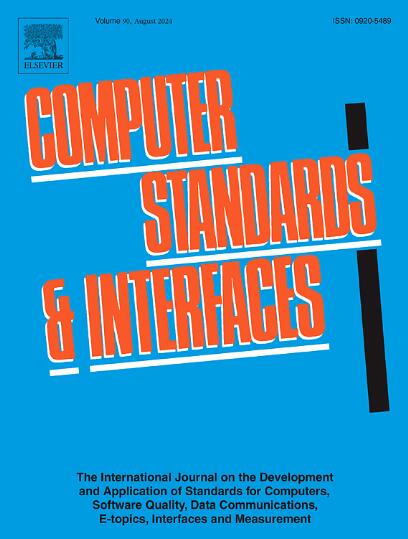Efficient structure-aware private set intersection with distributed interval function
IF 4.1
2区 计算机科学
Q1 COMPUTER SCIENCE, HARDWARE & ARCHITECTURE
引用次数: 0
Abstract
Structure-aware PSI protocol (Sa-PSI) allows both parties to identify pairs of points within a predefined distance threshold across their respective datasets. However, in previous work, the cost of computation scales linearly with the number of prefixes in the structure, which may become excessively large, and additionally, this protocol risks disclosing sensitive elements. In this work, we present a lightweight and efficient Sa-PSI protocol (LESa-PSI), which aims at achieving the computational cost independent of the number of prefixes in the structure while simultaneously minimizing information leakage. We formally define an FSS based on the two-sided intervals function — compact DIF. This compact DIF is instantiated for a single-dimensional two-sided interval function and then extended to -dimensional, which may be of independent interest. By combining compact DIF with a novel variant of DPF, we achieve key size compression for the set. Meanwhile, a structural decomposition strategy is proposed to divide the structure set, thereby enabling efficient function evaluation and computing the intersection. We prove that the LESa-PSI is secure in the semi-honest model. Furthermore, a comprehensive analysis of compact DIF and LESa-PSI is conducted through theory and experiments, with a comparison against some state-of-the-art works. The experimental results show that our compact DIF has a smaller key size, while the LESa-PSI has better performance in the intersection search and Bob’s elements evaluation.
具有分布区间函数的高效结构感知私有集交集
结构感知PSI协议(Sa-PSI)允许双方在各自的数据集中识别预定义距离阈值内的点对。然而,在之前的工作中,计算成本与结构中前缀的数量呈线性增长,这可能会变得过大,此外,该协议有泄露敏感元素的风险。在这项工作中,我们提出了一种轻量级和高效的Sa-PSI协议(LESa-PSI),旨在实现与结构中前缀数量无关的计算成本,同时最大限度地减少信息泄漏。我们正式定义了一个基于双边区间函数的FSS - compact DIF。这个紧凑的DIF实例化为一个单维的双边区间函数,然后扩展到d维,这可能是独立的兴趣。通过将紧凑的DIF与DPF的一种新变体相结合,我们实现了对集合的密钥大小压缩。同时,提出了一种结构分解策略对结构集进行划分,从而实现高效的函数求值和交集计算。在半诚实模型下,我们证明了LESa-PSI是安全的。此外,通过理论和实验对紧凑型DIF和LESa-PSI进行了综合分析,并与一些最新的研究成果进行了比较。实验结果表明,我们的紧凑DIF具有更小的键大小,而LESa-PSI在交集搜索和Bob元素求值方面具有更好的性能。
本文章由计算机程序翻译,如有差异,请以英文原文为准。
求助全文
约1分钟内获得全文
求助全文
来源期刊

Computer Standards & Interfaces
工程技术-计算机:软件工程
CiteScore
11.90
自引率
16.00%
发文量
67
审稿时长
6 months
期刊介绍:
The quality of software, well-defined interfaces (hardware and software), the process of digitalisation, and accepted standards in these fields are essential for building and exploiting complex computing, communication, multimedia and measuring systems. Standards can simplify the design and construction of individual hardware and software components and help to ensure satisfactory interworking.
Computer Standards & Interfaces is an international journal dealing specifically with these topics.
The journal
• Provides information about activities and progress on the definition of computer standards, software quality, interfaces and methods, at national, European and international levels
• Publishes critical comments on standards and standards activities
• Disseminates user''s experiences and case studies in the application and exploitation of established or emerging standards, interfaces and methods
• Offers a forum for discussion on actual projects, standards, interfaces and methods by recognised experts
• Stimulates relevant research by providing a specialised refereed medium.
 求助内容:
求助内容: 应助结果提醒方式:
应助结果提醒方式:


